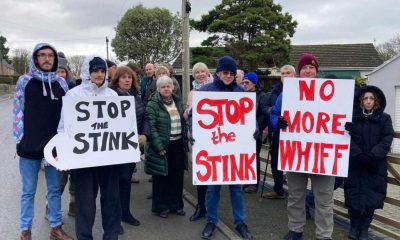Farming
WG won’t act to help tenant farmers

UNSCRUPULOUS landowners are attempting to evict farm tenants to regain possession of land let under Agricultural Holdings Act tenancies for tree planting purposes.
TFA Cymru reports that some landowners, in an effort to cash in on Welsh Government subsidies are trying to use a procedural trick to force tenants off productive farmland.
And it looks like the Welsh Government proposes to do nothing to stop them.
The Agricultural Holdings Act 1986 allows a landlord to use what is called a Case B notice to quit on a tenant if the landlord has gained planning permission for non-agricultural use of the land.
However, tree planting does not require planning permission and therefore a Case B notice to quit cannot be validly served by a landlord who intends to plant trees on the land which is subject to the notice.
TFA Rural Surveyor, Caroline Squire, said “We are seeing a lot of instances where landlords are attempting to resume land for tree planting by using Case B notices. Tenants are not able to contest these notices, so they are quite frightening when they arrive.
“However, tenants can ask for the notice to quit to be referred to arbitration to determine that it is an ineligible notice.
“It is critically important that the notice demanding arbitration is served by the tenant within one month of the date of the landlord’s notice to quit. Failure to respond within the deadline will render the landlords notice valid.
“The only circumstance in which a Case B notice to quit for tree planting might be valid is if the tree planting was ancillary to a development which had planning permission – for example, if there was planning permission for a timber processing facility and the land around it was required to grow timber to be used within that facility.
“Similarly, a landscaping requirement for a housing development might also fall within scope. However, straight tree planting without a co
nnected change of use confirmed by a planning consent will always be out of scope for case B,” said Caroline.
We asked the Welsh Government what steps it was taking NOW to protect tenant farmers’ rights and prevent the abuse of the notice system by rogue landlords.
We also ask what further steps, if any, it proposes to ensure tenants have increased security, tenant farms remain viable, and productive farmland is not destroyed in the pursuit of a subsidy.
And the answer to those questions was “not much”.
A Welsh Government spokesperson said: “We encourage tenants in receipt of Case B notices to seek immediate advice from a relevant professional, such as the Tenant Farmers Association, and act within the statutory deadlines.”
They continued to offer even less than “not much”: “We need to plant 86 million trees by the end of this decade if we are to meet NetZero carbon emissions by 2050.
“Properly managed, this also offers a considerable opportunity to the rural economy to create green jobs and skills in harvesting timber for high-value goods.
“We want to work with Welsh farmers and landowners to achieve this.”
In short, the Welsh Government will do nothing to address any current problems and prefers planting trees to food production.
Local MS Sam Kurtz, the Shadow Minister for Rural Affairs, said: “This is an alarming situation and one that deserves serious action from the Welsh Government.
“We already know that Welsh farmers are facing unprecedented pressure from foreign investors to sell off their land for tree planting. If that wasn’t enough, it now appears their attention has shifted to landlords – and so, putting further stress and strain on our tenant farmers.
“The Welsh Government must take serious and immediate action, and not wait for the introduction of the new farming support schemes. It is they who have created the lucrative woodland creation project. Except, it’s not Wales’s farming community who are benefitting from these projects, neither are the people of Wales.
“If we see the landscape of Welsh farms cut up, sold off, and diminished in favour of mass afforestation, then so too we will see the demise of Wales’s rural communities and economies.”
Farming
E-Tickets now on sale for Pembrokeshire County Show 2024

E-TICKETS are now on sale for this summer’s Pembrokeshire County Show, the largest county agricultural show in Wales. Preparations are coming together well for what is set to be a fantastic two days of livestock, competitions, attractions and much more.
General entry tickets for the show, taking place on Wednesday and Thursday, 14 & 15 August, are now available at an ‘early birds’ rate online from the website. Ticket prices have had to increase slightly to cover costs but still remain below 2019 charges. The early bird rate for Adults is £15, children £8 (5-16 years), Carers as well as children four years and under are free. Please visit: www.pembsshow.org to purchase your e-tickets.
Adam Thorne, President of Pembrokeshire Agricultural Society said, “At the event in August visitors will be able to tickle their tastebuds in the Castell Howell Food Hall, marvel at the livestock classes, enjoy watching the dog agility, be wowed by the showjumping, explore the horticulture, arts and crafts entries.
Shop ‘til they drop in the Country Market area, which will showcase over 40 quality local and award winning product and craft stalls and much more.”
Pembrokeshire Agricultural Society Membership packages are also available and these include admission to the Show and the Members’ Area. Purchasing membership of the society will support its aim to promote, advance and improve agriculture, horticulture and rural crafts and skills by the improvement of livestock and the demonstration and showing of livestock, machinery, crafts, products, methods and processes connected with agriculture and agricultural education in particular by the holding of an annual show. Full details are available on the website: Become A Member | Pembrokeshire County Show | Pembs Agricultural Society (pembsshow.org)
Putting together this event is hard work and requires an enormous effort by the staff, volunteers and trustees of Pembrokeshire Agricultural Society. The Society is indebted to so many for their commitment and support in helping host the event.
A special mention must go to the county show sponsors. Pembrokeshire Agricultural Society is proud to have many local, regular, sponsors who make the event possible.
Sponsorship Director, Richard Cole, said, “Sponsorship and Pembrokeshire County Show have been a successful combination for the last 45 years. Sponsors have enjoyed promoting their businesses through the varied mediums of banners, announcements, show rings, buildings, equine and livestock classes and championships over the years. It isn’t too late. If you’d like to discuss becoming a corporate sponsor please complete the form on our website: www.pembsshow.org.”
Farming
Pembrokeshire Agricultural Society in search for county’s top progressive farmers

IF you farm in Pembrokeshire and can demonstrate your farm’s use of the latest technological methods to promote progressive, sustainable agriculture then the Pembrokeshire Agricultural Society encourage you to enter the prestigious Baron de Rutzen Award.
Adam Thorne, Pembrokeshire County Show President, said, “We are looking for local Pembrokeshire farmers, under the age of 45, who can demonstrate their farm’s use of the latest technological methods to promote progressive, sustainable agriculture. They also need to show consideration for the environment and habitat sensitivity on their farm as well as present an aesthetically pleasing example of farming in the county. The competition welcomes all livestock and arable sectors to take part.”
Last year’s winners of the Award were Mark and Caroline Davies of Little Newcastle, Haverfordwest. They milk 230 pedigree Holsteins through a fully automated system. They rear their own replacements and also have a small beef enterprise. The farm is all grassland and they follow a strict reseeding and liming policy to optimise the yield from their multi-cut silage system. The couple place significant emphasis on animal health, husbandry and breeding to maximise the efficiency of their system.
Baron John Fredrick De Rutzen was President of Pembrokeshire Agricultural Society in 1936 and the Baron de Rutzen Trophy was produced in his memory. The third Baron served in the Welsh Guards and tragically died, aged 36, in 1944.
This year’s entrants must be fully practising farmers within the county of Pembrokeshire and were under the age of 45 years on 1 January 2024. Entries can either be by nomination or direct application online on the Pembrokeshire Agricultural Society website. Click here to apply: Baron de Rutzen Award | Pembrokeshire County Show | Pembs Agricultural Society (pembsshow.org)
The closing date for nominations and applications is at noon on Wednesday, 29 May 2024.
Farming
Pembrokeshire Agricultural Society elect new president

ARABLE and beef farmer, Adam Thorne, has been unanimously elected to become the new President of Pembrokeshire Agricultural Society for the year ahead. Adam is the third generation of his family to hold the position.
During the Annual General Meeting of Pembrokeshire Agricultural Society, held last week on the Pembrokeshire Showground, Mr Tim John and his wife Margaret John were also voted in as Presidents elect.
Adam Thorne has had a long association with Pembrokeshire Agricultural Society. After visiting the show as a toddler, then helping show the family’s pedigree Herefords, his uncle got him into helping him with stewarding in his early teens. From there he progressed to being a Steward with his own section, Commercial Cattle, and then also the Butcher’s Lambs section.
From stewarding, Adam became involved with committee work, starting as an Executive and then on to the former Finance and General Purposes Committee. He has been Chairman of the Estates Committee for 12 years and is now a Board member and a Trustee.
Adam said, “I am proud of my long association with Pembrokeshire Agricultural Society. I am the third generation to now be President, following my late grandfather, Walter Thorne, my father, Robert Thorne and more recently my uncle, George Thorne. I am looking forward to my year in the prestigious position.”
Away from his work with the society, Adam runs the family’s arable and beef farm in Robeston West, Milford Haven. He has been heavily involved with Tiers Cross YFC from an early age, having been Club Secretary twice and Chairman. He has also sat on Pembrokeshire County YFC Committees and the Wales YFC Rural Affairs Committee.
The 2024 Pembrokeshire Agricultural Society officeholders, announced at the AGM, include Miss Ffion Edwards who was awarded the role of Ambassador at last year’s show. Ffion, a nurse from Maenclochog, has enjoyed many years of attending the county show and believes that there are so many good elements to it. Ffion has been a member of Llysyfran YFC for 15 years and enjoys every aspect of young farmers – trying new experiences, competing and travelling to name a few. Mrs Nicola Owen was also elected as the Honorary Treasurer.
Brian Jones, the outgoing Pembrokeshire Agricultural Society President, took the opportunity to thank everyone who had helped and supported him throughout his presidency. During his year as President, Brian and his wife Helen, raised a tremendous amount of money for various charities including the Pembrokeshire Agricultural Society, RABI, Tir Dewi and the DPJ Foundation. Brian also gave his assurances that Castell Howell will continue to sponsor the Food Hall for future years.
Pembrokeshire County Show, the largest county agricultural show in Wales, will be held over two days again this summer on 14 and 15 August. Everyone is invited to attend the celebration of rural life in the county.
Pictured (left to right): Ffion Edwards the Ambassador for 2024; Adam Thorne, President; Margaret and Tim John, the Presidents Elect.
-

 News2 days ago
News2 days agoPolice and air ambulances at ‘serious incident’ at West Wales school
-

 News6 days ago
News6 days ago20mph U-turn: Some roads will return to 30mph following public outcry
-

 Community6 days ago
Community6 days agoMiracle pup finds her forever home after heart-wrenching journey
-

 Crime2 days ago
Crime2 days agoPembrokeshire pensioner accused of 17 sexual offences against children
-

 Crime2 days ago
Crime2 days agoAll three school stabbing victims discharged from hospital, police confirm
-

 Community4 days ago
Community4 days agoCounty Hall to offer space for community banking
-

 Business9 hours ago
Business9 hours agoLargest Welsh port appoints communications and marketing director
-

 Crime4 days ago
Crime4 days agoBrian Davis: Wanted on suspicion of commercial burglary


































